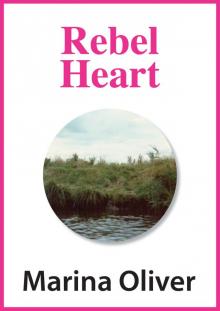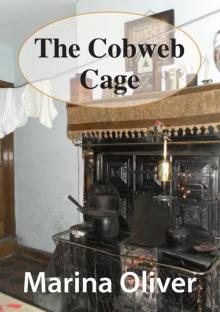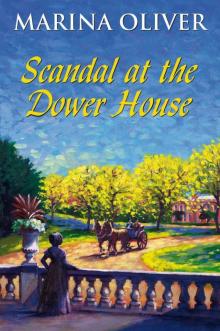- Home
- Marina Oliver
Scandal at the Dower House Page 9
Scandal at the Dower House Read online
Page 9
‘I’ve written to Uncle Ivor, and so has Eduardo,’ Joanna went on. Catarina knew this was inevitable. She could soon expect a visit from her uncle and she dreaded the forthcoming confrontation. He would blame her. It would make no difference to him that Joanna had secured a wealthy husband. He disliked all foreigners, and the further away from England they were the more he disliked and despised them. In his eyes, a Brazilian would be as bad as a Hottentot.
Catarina finished the letter. Eduardo had several houses, all of them delightfully spacious and sumptuously furnished, and simply miles of land, many huge plantations on which he grew sugar cane and coffee. Rio de Janeiro was a beautiful city and she had her own carriage and driver. The other Portuguese residents had made her welcome and she had been presented to the royal family. It would be such a shame when they decided it was safe for them to return to Lisbon, since many of the delightful courtiers would no doubt return with them. But that might be good for Eduardo, as he was much in the confidence of the prince, and might secure diplomatic missions, which would enable her to visit Europe, even London, and see her dear Catarina again.
There was no mention of Maria apart from that transfer of her parentage. Joanna, true to her resolve, wanted nothing to do with her daughter, did not ask how she fared, or even if she were still alive. When so many babies died in their first year it could have happened. Catarina felt a renewed anger against her sister and, in order to calm down, walked out into the garden.
It had rained almost continuously since they arrived back in England, but today, though the sky was full of scudding black clouds, it was dry, though not as warm as Catarina expected at the end of March. Perhaps, in the warmer climate of Portugal, she had simply become unaccustomed to a cold, wet and windy English spring.
She was looking across the hedge into the park, wondering whether she wanted to visit her old home, or whether it would bring back too many memories, when she heard the sound of horses and carriage wheels. She turned, saw a familiar curricle, and began to tremble. She was not ready for this, she told herself. She needed more time to prepare herself for meeting Lord Brooke.
He leapt down and strode through the gate a few yards away from where she stood, talking as he came towards her along the gravel path.
‘Catarina! I didn’t know you were home! Where have you been all this time? Oh, my darling girl, I’ve been so very worried about you,’ he said, and before she knew what was happening, she was in his arms and he was smothering her face with kisses, pushing her hat away from her face so that he could look down into her eyes.
*
Nicholas held her away from him.
‘You are more beautiful than ever,’ he said, and trailed a finger down her cheek and across her lips. He felt her tremble and saw in her eyes the welcome she could not hide before she dropped her gaze.
‘My lord,’ she managed, but her voice was hoarse and he felt a stirring of joyous anticipation. She was far from indifferent to him. She was wearing a lilac muslin dress, half mourning, he realized, as it was trimmed with black ribbons around the hem. She had a green and grey Paisley shawl around her shoulders. Apart from her red riding habit, it was the first time he had seen her in colours instead of the unrelieved black she had worn after Walter’s death.
‘I’ve been away, in London, on Parliamentary business,’ he said, his own voice a little husky. ‘How long have you been home?’
‘Just three days – I think,’ Catarina began, attempting to straighten her hat. At that moment the rain began. ‘Oh, do come inside, my lord. Send your man round to the stables. Come, you’ll be wet through in moments!’
Laughing, they ran for the nearest door which happened to be into the kitchen. They were very wet, for the rain had been swift and heavy. Nicholas shook his head and droplets of rain spattered from his hair. Catarina threw off her hat, which had protected her own head, but the fabric of her gown clung to her legs. They were, he noted, as shapely as he had expected. He felt a surge of desire and had great difficulty in remembering the interested servants who were working in the kitchen.
‘Come into the drawing room,’ Catarina said. ‘Liza, can you bring some wine? And I think his lordship might appreciate a towel to rub his hair.’
Nicholas could have done without the wine and the attentions of the servants, but he had to endure them. As he sat with a glass in his hand he was thinking that his somewhat ambiguous feelings for Catarina had solidified into a real resolve. He had desired her almost from the beginning, when she had been so controlled and in command at the time of Walter’s death. She was beautiful, and he readily admitted he would like to take her to his bed. Now he knew his feelings were deeper than mere lust. The sudden surge of joy he had felt on seeing her was more than relief at her safe return, it was a primitive desire to possess her for the rest of his life. This, he told himself, was true love.
Should he tell her now, or give her time to understand? He had sensed, during that swift embrace, her own willing response, but to ask her to be his wife, so suddenly, might be premature. Didn’t females prefer to be courted, to come to a gradual realization of a suitor’s intentions? As he had never courted a girl with a view to marriage before he was astonishingly uncertain. He was still debating when there was a thunderous knock on the front door. Staines could be heard crossing the hall to open it.
‘Come on, man, why do you take so long? I’m soaked! This weather is appalling, they haven’t managed the spring planting yet, and unless the ground dries soon they will be far too late.’
‘Allow me to take your hat, Sir Humphrey, and your driving coat. Have you sent your man to the stables?’
‘Of course I have!’
Nicholas, suppressing his irritation at the interruption, muttered that the Dower House stables would be getting rather crowded.
Catarina chuckled, but Sir Humphrey was still in full flow.
‘I’ve only just been told Lady Brooke is at home. I do think a message might have been sent to an old friend, not leaving me to hear by accident from one of my tenants.’
‘I suspect her ladyship wished for a few days to settle back at home after her journey, Sir Humphrey. She is in the drawing room.’
And there, thought Nicholas, goes all hope of any private conversation with Catarina.
On the following day Catarina was in the small library writing a reply to Joanna when Staines came into the room.
‘My lady, there are two of the village men come, asking if you would see them.’
Catarina sighed. ‘It seems the entire village wants to call now it is known I am back.’
Mrs Eade had arrived soon after Sir Humphrey and, as soon as the rain had ceased, all three visitors had decided they ought to try to reach their homes before another downpour came. They were all wet and uncomfortable and wanted to change out of their damp clothes. There had been time for no more than basic civilities, no time for Catarina to tell them about Joanna’s marriage. She knew that if she had mentioned it they would have wanted all the details, and at that moment, she did not feel capable of providing a rational explanation.
‘Shall I send them away?’
‘No, I suppose I had better see them now in case it is important. Bring them in, Staines.’
The men, two of the older villagers, came in rather sheepishly, wiping their hands over their hair.
‘Tom, Billy, what can I do for you? Do sit down.’
‘Well, my lady,’ Tom began, ‘we don’ like ter bother you, but it’s like this. No one else’ll listen, and we thought perhaps, well, you might be able ter put a word in for us wi’ Mr Jeremy.’
‘Why can’t you speak to him?’
‘It don’t do no good, ’e won’t listen!’ Billy said. ‘But if ’e does it, what’ll us do fer feed?’
‘Feed?’ Catarina was bewildered.
‘Let me explain, our Billy. You’m too excited ter make sense.’
Billy scowled. ‘Get on wi’ it then.’
Tom took a deep breath. �
��Mr Jeremy, see, ’e wants ter put fences round common. Ter keep ’is own cattle separate. Says they’m special, an’ mustn’t breed wi’ ours. Can’t see what difference it meks. A bull’s a bull, ain’t it, beggin’ yer pardon, my lady.’
Catarina immediately saw the problem.
‘Then where will you graze your own cattle and sheep?’
‘We won’t ’ave nowhere.’
‘Us can’t afford ter pay rent fer fields. An’ the common’s bin free fer generations back, since that there Magna Carta they talk about so much, an’ such like. Mr Jeremy’s got no right ter tek it from us.’
‘And ’e wants ter change the taps. If we do as ’e says, an’ change over so’s all my taps are in one field, I’ll ’ave all the poor land and none o’ the good,’ Billy said. ‘It ain’t fair.’
‘So, my lady, we came ter see if you’d put in a word fer us, talk ter Mr Jeremy. If yer ’usband were still alive there’s be none o’ this silly changin’ the way things be done. They’ve bin good enough fer us, an’ our fathers an’ grandfathers before us, fer generations.’
He stopped, and the two men looked at one another, then nodded slowly.
‘Well, thanks fer listenin’, my lady,’ Tom said. ‘We’d best go now we’ve ’ad our say.’
‘I’ll see Mr Jeremy for you,’ Catarina said slowly. ‘I can’t promise it will do any good, but at least I will tell him he must find other grazing for your animals. Now go to the kitchen and Staines will give you some ale.’
Chapter Seven
NICHOLAS WATCHED AS Jeremy strode nervously about the room. He limped, but it was not too noticeable, and by now it discommoded him hardly at all.
‘Nick, what can I do? They are so hidebound! They don’t see how such improvements could benefit them in higher production and better prices.’
‘They clearly have not understood.’
‘But I’ve explained until I’m blue in the face, and most of them refuse to listen. They even turn away from me when I drive or ride through the village. When I first came they were friendly and tipped their caps whenever they saw me. Now I feel I’m hated!’
‘Country folk dislike change.’
‘Not all of them. Some, well, two, of the farmers understand me. But they’ve had enclosures for many years and have seen the benefits.’
‘Can you not get them to explain to the others?’
‘They say they’ve tried, but it does no good. Besides, one of the fellows said to me that if they grew richer they’d have to pay more to the poor tax.’
‘Perhaps Lady Brooke might be able to explain. Have you been to see her since she came home?’
‘No. I thought I’d let her settle in before calling. Do you think she might have any influence with them?’
‘They liked her husband and they appreciated the changes he made. They haven’t objected to the drainage schemes, have they?’
‘No, and they have worked on them. It has given them extra wages.’
‘Because it was of benefit to them and they could see it immediately. Jeremy, I think you must take this slowly, show them the benefits.’
‘How? Unless they all agree to amalgamate their strips of land and create consolidated fields I can’t demonstrate the benefits. And I’m not permitting my own animals to mate indiscriminately with their scrawny cattle and sheep, so I have to enclose the common and cut part of it off for my beasts. If they won’t agree to do it I’ll have to have an Act to make them.’
‘Do you need all of it? Why not use the marsh pastures and just enclose a small portion of the common?’
‘It seems ridiculous that I can’t do what I choose with my own land and, even though it will be better for them, they oppose me!’
‘Perhaps if Parliament reduces some of the taxes as is proposed they will consider it.’
‘But that won’t be in time to do anything this year.’
‘You must not be impatient,’ Nicholas said, and thought ruefully of his own impatience to go back to Catarina.
‘I’m not impatient when I consider how many years it could take to improve the strain of cattle or sheep,’ Jeremy said. ‘But the sooner I can start the better. I feel I’ll be waiting, doing nothing for a year or more.’
‘Well, you can spend some of the time in London this Season. It will be a busy one, now the wars are over.’
‘Unless half the people go off to Paris. And many of my friends died at Waterloo.’
Nicholas nodded. ‘That does not mean you have to give up your own pleasures.’
‘Are you going up soon?’
‘I’m opening the town house for Olivia, if I can find a suitable matron to introduce her.’
‘Not Aunt Clara?’
Nicholas laughed. ‘She feels it necessary to visit Paris this year. Perhaps my offer to pay her expenses influenced her decision. No, I want someone more sympathetic. Olivia is shy; she needs to be encouraged rather than chastised all the time.’
‘It’s a great pity you haven’t yet got into parson’s mousetrap. Then your wife could present Olivia.’
Catarina had never had a Season herself, and she had spent little time in London, so would not know the right people. That would not do. Nicholas shook his head.
‘I have a couple of dowagers in mind who will do it for a fee. Of course I must be in town for her ball, but otherwise my plans are uncertain.’
Until, he said to himself, he knew whether Catarina would accept his offer. If she did he would urge a speedy marriage.
Catarina pondered for a long time over what she could do to help the villagers. She understood Jeremy’s desire to change things. Walter had been intending to do much the same, but Walter would have done it slowly, talked to the villagers, and persuaded them to his views before making the changes. He would not have allowed anyone to suffer. He had done this with regard to the cottages and the draining of the marsh. And he had been a much older man, with less time to achieve what he desired, she thought with a regretful sigh. He’d had less time than he’d anticipated. Jeremy was so much younger, but in so great a hurry.
Ought she to visit him, or ask him to come to her? She had not seen him since she arrived home. She was reluctant to go up to the Grange in case she met Nicholas. She had ceased thinking of him as Lord Brooke. His greeting, his words, his calling her his ‘darling’, had at first startled her, and then, when she had been unable to sleep for thinking of their significance, delighted her. She had not expected another opportunity for marriage to come to her, unless it was an offer from Sir Humphrey, and that she would certainly refuse.
Until now she had thought she would refuse any offer, and when she had seen a tentative admiration in her cousin Antonio’s eyes she had rejected the very idea that he might wish to marry her. Now she was not so certain. She was still only five and twenty, no debutante, but young enough to marry again. Had Nicholas’s words indicated he meant to make an offer, or had they just been the friendly greeting of a cousin?
It was a cold, wet day again and, as she sat before the fire in the front half of the big drawing room, she dismissed her thoughts during the night as ridiculous dreams, foolish imaginings. Nicholas had his pick of eager young debutantes, and since he had reached the age of thirty without succumbing to any of their blandishments, or feeling the need to marry and produce an heir, why should he choose an older woman? But he would want an heir eventually, and he would think her barren when there had been no child during her eight years of marriage with Walter. He would not know, and how could she tell him, that they had never lived as man and wife?
She was trimming one of Maria’s dresses with coloured ribbon when Staines announced a visitor. It was Sir Humphrey. She tucked the dress into her sewing basket and rose to greet him.
‘I did not expect any visitors while this rain lasted,’ she said, giving him her hand.
‘That’s why I came today. Thought I had a chance of finding you alone. And I drove over in the carriage, so I’m not wet, even if my horses are.
I sent them round to the stables, knew you would not object.’
‘Of course not. I trust your coachman will go to the kitchen for something to warm him. Would you prefer wine, or coffee, Sir Humphrey.’
‘Nothing, thank you, my dear. I don’t want any distractions from what I have to say. Catarina, it’s over a year since poor Walter died and I wouldn’t have spoken before now, even if you hadn’t been away, and despite my eagerness. But you’re a young woman still, you ought to have the protection of a husband, be able to go out in Society and enjoy yourself, not hide yourself away in a small village miles from London.’
‘I have no intention of hiding myself away,’ Catarina interrupted, suspecting what was coming and wanting, if she could, to deflect it.
‘A widow cannot entertain or go out in Society in the same way a married woman can. You must know that. And you are still young, and beautiful. My dear, you are wealthy with what your father and Walter left you. You’ll be prey to all sorts of unscrupulous fortune-hunters, and you’re not up to snuff. You need a man’s protection.’
For a wild moment Catarina wondered just what sort of protection Sir Humphrey was offering.
‘I may not be familiar with London Society, but I think I can tell whether men want me for my fortune or not,’ she said, and then almost giggled.
Sir Humphrey was no more than comfortably off. Chase Manor was just a small manor house and he owned no other. Nor was his estate large. If he went to London, which was seldom, he stayed in an hotel, not possessing a town house, and in Bath he hired apartments in one of the best hotels. Could he possibly be thinking as much of her money as of herself?
‘My dear, take it from me, you need a man’s protection, that of a husband, and I am begging you to permit me to become that husband.’

 Rebel Heart
Rebel Heart Theft of Love
Theft of Love Courtesan of the Saints
Courtesan of the Saints Fatal Slip
Fatal Slip Highwayman's Hazard
Highwayman's Hazard The Cobweb Cage
The Cobweb Cage The Irish Bride
The Irish Bride Apple Blossom Bride
Apple Blossom Bride Scandal at the Dower House
Scandal at the Dower House Eugenie and the Earl
Eugenie and the Earl Her Captive Cavalier
Her Captive Cavalier The Glowing Hours
The Glowing Hours Sibylla and the Privateer
Sibylla and the Privateer The Baron's Bride
The Baron's Bride Player's Wench
Player's Wench Gavotte
Gavotte The Chaperone Bride
The Chaperone Bride A Murdered Earl
A Murdered Earl Charms of a Witch
Charms of a Witch Convict Queen
Convict Queen The Accidental Marriage
The Accidental Marriage